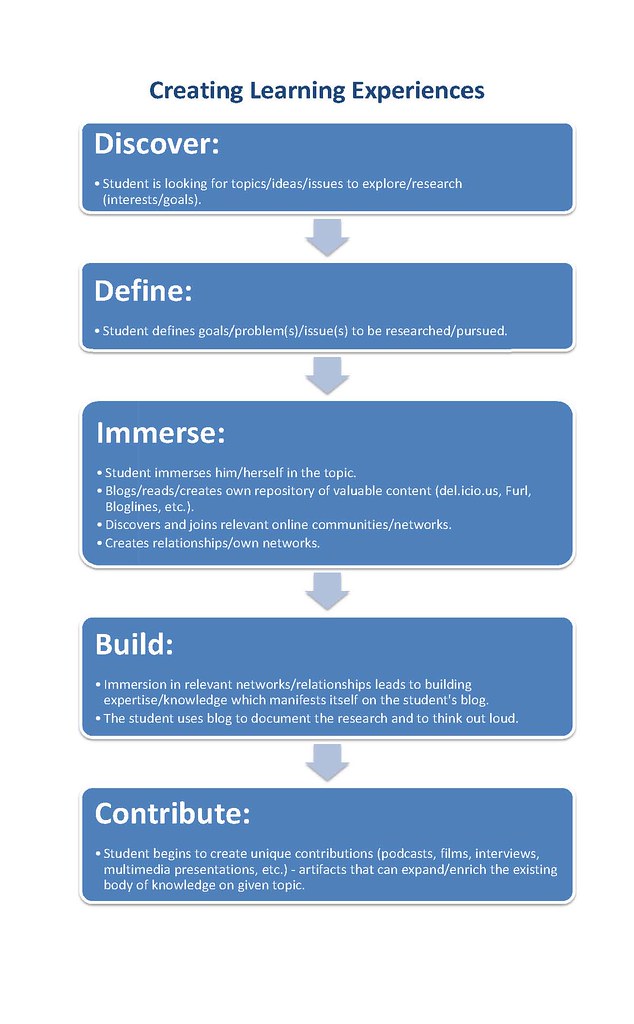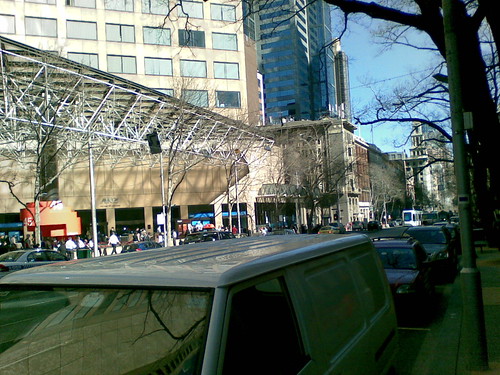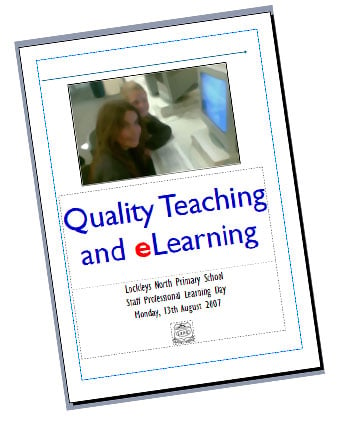Konrad Glogowski has written one of the best posts of the year for any edublogger interested in the concept of inquiry learning or student initiated learning. Like Barbara Ganley, Konrad's relatively infrequent posts are skillfully written with insightful detail that shows an open educator at their best. I was really taken by the parallel lines that I could see in my own attempts with my class's Personal Research Projects from last term and the start they have made for this term. Konrad teaches older students than myself but many elements of his process were of immense interest to me, especially in the light of the excellent and thought provoking feedback I had received from Artichoke after my most recent post on this topic. Konrad detailed some of his thinking in the following way:
I started thinking about their progress as researchers and it occurred to me that the whole class seemed to follow the same pattern. Once I gave them the freedom to find a topic they were interested in, they began to seek out and immerse themselves in learning experiences. No one really seemed to care about grades or tests. Instead, they were immersed in learning about topics they cared about. Looking back, I realize that the process that the whole class engaged in consisted of four stages. Vanessa and Trudy, however, moved beyond into the fifth stage. The girls, along with their classmates, inspired me to start thinking about the process of creating learning experiences.
He also shared a diagram outlining the five stages:

As is usual with high quality posts, they usually attract high quality comments. In line with his thorough blogging process, Konrad addresses all comments with a personal response that is often blog post sized in itself! Not wanting to lower the tone but wanting to contribute and add to a conversation that seemed to be another jigsaw piece to this concept of individual inquiry learning that Arti, Doug and I were percolating back at my blog, I added a comment. Basically I pointed Konrad back to my recent post, adding the mental link I had made between our classroom practices.
Probably, the big difference is that I am still pushing a product based end point while I am really interested in the Contribute stage and wonder how younger middle school students might make that happen.
Konrad' response in full here was:
Graham,
Thank you for linking to your very engaging post and the ensuing discussion.
There is a lot to digest there and I do intend to address your thoughts and those of Artichoke in a separate blog entry. However, there is one thing that intrigued me and I would like to comment on now.
The culminating presentation, in my opinion, is a great idea. You wrote that “adding the final presentation in front of their peers added another layer of purpose to their work.” Does that mean that the children do not have access to the work of their peers as it unfolds? You see, the reason I ask is because I have used an approach that is similar to yours (and described in this entry) but without a final, culminating presentation. Your entry made me realize that I should definitely incorporate it into the process. The reason why I have never had it before as the final part of the research process is because the community that the students built with their individual blogs already added what you referred to as “another layer of purpose.” In other words, there was already so much interaction and feedback happening online during the research process (in the form of comments and even blog entries about the work of their peers) that the final presentation did not seem necessary - the students were encouraging, supporting, and learning from and with each other during their individual research journeys. It seemed to me that the final presentation would be repetitive because most students were very well aware of what their friends were engaged in. It also seemed quite final and definitive, reminiscent of what Carol Kuhlthau refers to as “Search Closure” (Kuhlthau’s Model of the Stages of the Information Process).
Your entry, however, convinced me that the final presentation is a very valuable component of the inquiry process. You have inspired me to incorporate it into this approach. However, since I see the last three stages of the process I described above - Immerse, Build, Contribute - as a cycle, I am now thinking of asking students to present their work at the end of each IBC cycle, as opposed to at the end of the term/year. That way, they will present more frequently but their presentations will not be as long or definitive - they will present as researchers still very much engaged in the process of researching and learning, not as students who finished their project. (I see it as a kind of conference poster session, where the point is to share what one’s been working on, not necessarily reveal the findings of the research).
As you can see, I am really interested in the IBC cycle. I see it as a kind of spiral that keeps the students engaged. So, what if I increased the frequency of these presentations, so that the students could present every time they contributed something to their chosen fields? What are your thoughts? Could that work? Should the final presentation still be the final component of this approach? Personally, I think it could be an opportunity to summarize the previous presentations and explore possible future research possibilities.
Your thoughts?
Thanks again for sharing your ideas with me!
It struck me that Konrad's process of using blogs as the vehicle for his students to explore their topics was the very thing that negated the final presentation product so I was intrigued that he saw that part of my process as being of value as an addition to his own process. This was because I had been questioning that idea's validity since Artichoke's 5 points about inquiry learning. I was also attracted to Konrad's students' pursuit of individual topic choices (albeit under the banner of Human Rights) after putting my students' "something new" topic choices under a big question mark based on Arti's point that "the research suggests that inquiry works best when kids are already experts in the domain". Konrad's student blog use to keep each other informed of mutual progress and learning is indeed a missing component of my own process and one to give serious consideration to for future projects, because my own student "do not have access to the work of their peers as it unfolds".
I still need to go back to Konrad's blog and address the questions he asks properly. I was hoping that writing this post might have helped me in that regard. More careful thinking to be done. I'll take a leaf out of Konrad's book and make sure it is thought our properly and not a rush job.




